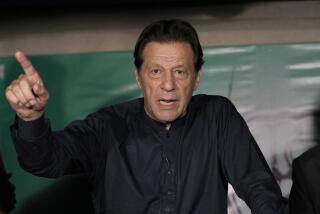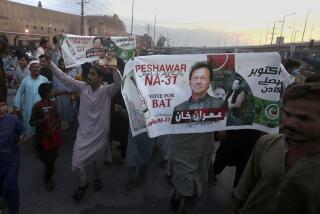Pakistani Court Orders Islamic Militant Released
- Share via
LAHORE, Pakistan — A Pakistani court Monday ordered the release of a prominent Islamic militant who led a group that is blamed for an attack on India’s Parliament and has been declared a terrorist organization by Washington.
The court said the government’s detention of Hafiz Mohammed Saeed was unlawful. Saeed, leader of Lashkar-e-Taiba until it was banned by the government last year, was placed under house arrest Oct. 31 after being held without charge for months.
Lashkar-e-Taiba, one of the main groups fighting Indian rule in the disputed territory of Kashmir, was banned by Pakistan after the United States declared it a terrorist organization last year.
New Delhi blamed the group for an attack on its Parliament in December, an incident that helped sharply escalate tension between nuclear-armed neighbors India and Pakistan.
Saeed now heads the newly formed hard-line Islamic group Jamaat ud Daawa, which early this month denounced the U.S.-declared war on terror and called on Muslims to wage jihad, or holy war.
High Court Judge Chaudhry Ejaz Ahmad ruled that Saeed’s house arrest was illegal because he had not been charged with any crime. Saeed should be “released forthwith if not required in any case,” the judge said.
There was no immediate comment from the government as to whether he would be released or kept under detention on some other basis.
The order for Saeed’s release came a day after a controversial law that allows security authorities to detain terror suspects for a year without charges took effect. The law was not in force when Saeed was detained.
Saeed’s family said he had been detained by Pakistan’s intelligence services since May 15. This had never been acknowledged by the government.
Islamic militant groups in Pakistan strongly oppose President Pervez Musharraf’s support for a U.S.-declared war on terror and are suspected of being behind a wave of attacks on Christians and foreigners in the country.
Riding a wave of anti-U.S. sentiment, a coalition of six Islamic parties made an unexpectedly strong showing in general elections Oct. 10.
More to Read
Sign up for Essential California
The most important California stories and recommendations in your inbox every morning.
You may occasionally receive promotional content from the Los Angeles Times.










